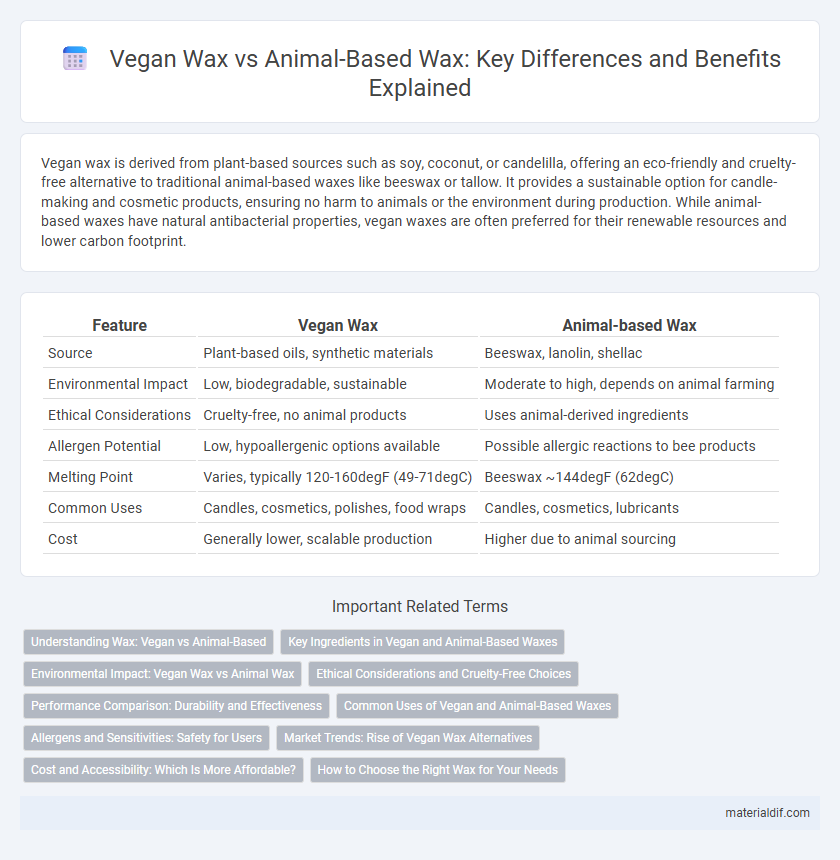Vegan wax is derived from plant-based sources such as soy, coconut, or candelilla, offering an eco-friendly and cruelty-free alternative to traditional animal-based waxes like beeswax or tallow. It provides a sustainable option for candle-making and cosmetic products, ensuring no harm to animals or the environment during production. While animal-based waxes have natural antibacterial properties, vegan waxes are often preferred for their renewable resources and lower carbon footprint.
Table of Comparison
| Feature | Vegan Wax | Animal-based Wax |
|---|---|---|
| Source | Plant-based oils, synthetic materials | Beeswax, lanolin, shellac |
| Environmental Impact | Low, biodegradable, sustainable | Moderate to high, depends on animal farming |
| Ethical Considerations | Cruelty-free, no animal products | Uses animal-derived ingredients |
| Allergen Potential | Low, hypoallergenic options available | Possible allergic reactions to bee products |
| Melting Point | Varies, typically 120-160degF (49-71degC) | Beeswax ~144degF (62degC) |
| Common Uses | Candles, cosmetics, polishes, food wraps | Candles, cosmetics, lubricants |
| Cost | Generally lower, scalable production | Higher due to animal sourcing |
Understanding Wax: Vegan vs Animal-Based
Vegan waxes, derived from plant-based sources like soy, coconut, and carnauba, offer eco-friendly, sustainable alternatives to traditional animal-based waxes such as beeswax or spermaceti. These plant-based waxes provide similar texture and burning qualities while eliminating the ethical concerns linked to animal exploitation and environmental impact. Understanding the composition and benefits of vegan versus animal-based wax helps consumers make informed choices aligned with their values and lifestyle.
Key Ingredients in Vegan and Animal-Based Waxes
Vegan waxes primarily utilize plant-derived ingredients such as soy, candelilla, and carnauba, which offer renewable, biodegradable alternatives with a lower environmental footprint. Animal-based waxes, including beeswax and lanolin, contain natural fats and esters sourced from insects and animals, contributing to their unique texture and melting properties. The key differences in composition influence factors like scent, hardness, and melting point, making ingredient selection critical for applications ranging from cosmetics to candle making.
Environmental Impact: Vegan Wax vs Animal Wax
Vegan wax, derived from plant-based sources like soy, coconut, or palm, significantly reduces environmental impact by minimizing resource-intensive animal farming and decreasing greenhouse gas emissions. Animal-based waxes such as beeswax involve apiary practices that may affect bee populations and biodiversity, contributing to ecological imbalances. Sustainable sourcing of vegan waxes supports biodiversity conservation and typically results in a lower carbon footprint compared to traditional animal wax production.
Ethical Considerations and Cruelty-Free Choices
Vegan waxes, such as soy, coconut, and candelilla, offer ethical advantages by eliminating animal exploitation and promoting sustainable sourcing. Animal-based waxes like beeswax and carnauba involve practices that may harm bees or other animals, raising concerns about cruelty and environmental impact. Choosing vegan wax supports cruelty-free consumption and aligns with ethical commitments to animal welfare and ecological responsibility.
Performance Comparison: Durability and Effectiveness
Vegan wax, derived from plant-based sources like soy, candelilla, and carnauba, offers comparable durability to animal-based waxes such as beeswax while providing a cleaner burn and reduced allergenic risks. Animal-based waxes excel in water resistance and adhering properties, making them highly effective for applications requiring moisture barriers. Performance effectiveness depends on specific use cases, with vegan wax favored for eco-friendly needs and animal-based wax preferred for robust sealing and longevity.
Common Uses of Vegan and Animal-Based Waxes
Vegan waxes, derived from plant sources such as soy, coconut, and candelilla, are commonly used in candle making, cosmetics, and food coatings due to their biodegradability and non-toxic properties. Animal-based waxes, including beeswax and lanolin, are preferred in skincare products, furniture polish, and pharmaceuticals because of their natural emollient and protective qualities. Both types of waxes serve essential roles in industrial applications, but vegan waxes dominate eco-friendly and vegan-certified products.
Allergens and Sensitivities: Safety for Users
Vegan wax, typically made from plant-based sources like soy, coconut, or candelilla, reduces the risk of allergens and sensitivities compared to animal-based waxes derived from beeswax or tallow. Plant-based waxes are hypoallergenic and free from animal proteins, minimizing skin irritation and allergic reactions for sensitive users. Choosing vegan wax ensures a safer, cruelty-free option suitable for individuals prone to allergies or skin sensitivities.
Market Trends: Rise of Vegan Wax Alternatives
The market for vegan wax alternatives has experienced significant growth driven by increasing consumer demand for sustainable and cruelty-free products. Vegan waxes, typically derived from plant-based sources like soy, candelilla, and carnauba, offer eco-friendly options with lower environmental impact compared to traditional animal-based waxes such as beeswax and lanolin. Rising awareness of ethical consumption and stricter regulations on animal-derived ingredients are key factors propelling the expansion of vegan wax products across cosmetics, candle making, and personal care industries.
Cost and Accessibility: Which Is More Affordable?
Vegan wax, typically made from plant-based materials like soy, coconut, or candelilla, tends to be more affordable and widely accessible due to sustainable sourcing and scalable production methods. Animal-based wax, such as beeswax, often commands higher prices because of limited supply and labor-intensive harvesting processes. Consumers seeking budget-friendly and ethically sourced options generally find vegan wax to be a more cost-effective and accessible choice.
How to Choose the Right Wax for Your Needs
Choosing the right wax depends on your values, skin sensitivity, and project requirements; vegan waxes, such as soy, coconut, or candelilla, offer plant-based alternatives that are cruelty-free and biodegradable, ideal for eco-conscious consumers. Animal-based waxes, like beeswax or lanolin, provide natural moisture-retaining properties and excellent viscosity but may not suit vegans or those allergic to animal products. Consider factors such as burn time, scent retention, and environmental impact to select a wax that aligns with your ethical preferences and functional needs.
Vegan Wax vs Animal-based Wax Infographic

 materialdif.com
materialdif.com